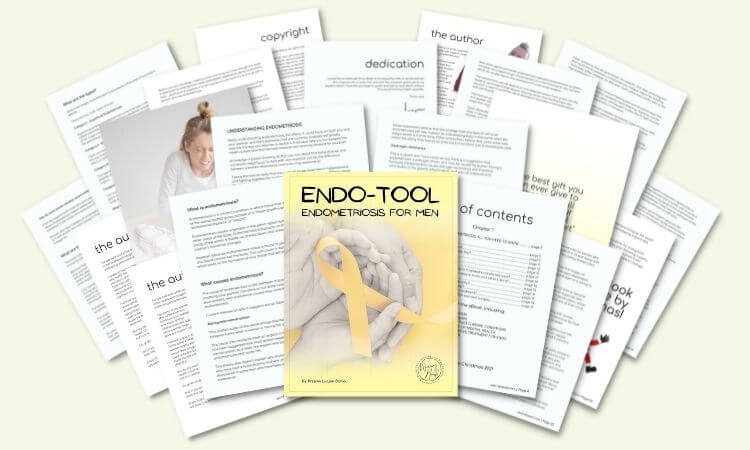How to make your husband understand endometriosis?
For a man to understand endometriosis, it can take some time. In order to figure out how to make your husband understand endometriosis, he needs to understand how the menstrual cycle works first, and then you can explain to your husband the basics of endometriosis.
Before I help you explain to him how the menstrual cycle works, here are 7 steps to make your husband understand endometriosis:
- Firstly, he needs to understand that endometriosis is a condition where the tissue that is similar to the one that normally lines the uterus grows outside of the uterus.
- Secondly, he should be aware that endometriosis can cause pain during intimate moments, urination, and bowel movements.
- Thirdly, he should know that endometriosis can also cause heavy bleeding and infertility.
- Fourth, it is important for him to understand that endometriosis is a chronic condition, and there is no cure.
- Fifth, he should be supportive and understanding, as endometriosis can be quite debilitating.
- Sixth, he should be willing to help with household chores and childcare, as fatigue is a common symptom of endometriosis.
- Lastly, he should educate himself on the condition, so that he can be a better support system for you.
By following these steps, your husband will be on his way to understanding endometriosis, and he can be a great support system for you.
- How to start a serious conversation with your husband?
- How to explain endometriosis to your husband?
- How to make your husband understand endometriosis?
- How does the menstrual cycle work?
- How to make your husband understand your period?
- What is endometriosis?
- What causes endometriosis?
- What are the symptoms of endometriosis?
- How to explain endometriosis pain to your husband?
- How is endometriosis diagnosed?
- How is endometriosis treated?
- How does endometriosis impact your daily life?
- How will endometriosis affect your husband?
- How to make your husband understand endometriosis?
How to start a serious conversation with your husband?
Don’t start by saying “can we talk” or “we have to talk.”
Instead, begin by explaining that this topic is very sensitive and difficult for you to discuss. Acknowledge that you are aware of having different perspectives and that this conversation will help him cope better with your condition.
Here are some tips on how to talk to him about endometriosis:
- Let him know that you need his support.
- Explain how endometriosis affects you.
- Be open about your symptoms.
- Share your feelings.
- Let him know what you need from him.
- Encourage him to educate himself on the condition.
- Thank him for his support.
By following these tips, you will be able to have a productive conversation about endometriosis and be ready to explain endometriosis to your husband.
If you want to learn how to cope with your partner’s illness, how to support her, and manage a relationship with endometriosis, I give away a FREE Chapter of my “Endo-Tool: Endometriosis for Men” eBook! This chapter alone has all the comprehensive medical knowledge, such as:
- What is endometriosis?
- What are the symptoms?
- What causes endometriosis?
- What does endometriosis look like?
- What are the stages?
- What are the types?
- What is adenomyosis and how is it related to endometriosis?
- Why do some women develop severe endo and others don’t?
- Does endometriosis cause infertility?
- How is endometriosis diagnosed?
- Do types and stages affect the treatment?
- Recurrence of endometriosis after excision surgery.
FREE Chapter of “Endo-Tool”!
an Endometriosis for Men book

How to explain endometriosis to your husband?
Making your husband understand endometriosis can be difficult, but it is possible. You just need to have patience and explain things in a way that he can understand.
To reassure you, at the very beginning, I couldn’t spell the word “endometriosis”, let alone understand it! Today, I teach other men everything about this chronic illness on this very blog. From knowing absolutely nothing to spreading awareness about endometriosis, I have come a long way and so can your husband!
But being a husband, I know how to make your husband understand endometriosis but in order to do that, firstly, you need to know how to explain to him the following:
- how the menstrual cycle works
- how to make your husband understand your period
Secondly, you need to dig deeper and explain to him the following basics:
- What is endometriosis?
- What causes endometriosis?
- What are the symptoms of endometriosis?
- How to explain endometriosis pain to your husband?
- How is endometriosis diagnosed?
- How is endometriosis treated?
- How does endometriosis impact your daily life?
- How will endometriosis affect your husband?
Let’s begin…
How to make your husband understand endometriosis?
Let’s answer all the above questions one by one beginning with the basics of how the menstrual cycle works. It can be a lot to remember, so the best thing you can do when having the conversation is to have this article handy or even let your husband read it.
How does the menstrual cycle work?
The menstrual cycle is the process that a woman’s body goes through every month to prepare for pregnancy. The cycle begins on the first day of bleeding and ends when the next period starts.
The average menstrual cycle is 28 days long, but it can range from 21 to 35 days. The first half of the cycle, from the first day of bleeding to ovulation, is called the follicular phase. The second half, from ovulation to the first day of the next period, is called the luteal phase.
Ovulation is when a mature egg is released from the ovary. The egg travels down the fallopian tube and awaits fertilization by a sperm. If the egg is not fertilized, it will break down and be shed with the lining of the uterus during menstruation.
How to make your husband understand your period?
A period is when the lining of the uterus is shed through the vaginal muscle. This happens when the egg is not fertilized and does not implant in the uterus. The average length of a period is three to five days, but it can range from two to seven days.
Most women bleed an average of five days during their period. The amount of blood that is lost can range from a few drops to a cup or more.
With endometriosis, bleeding can be much heavier and last longer than a normal period. It can also be very painful.
What is endometriosis?
Endometriosis is a chronic condition that affects women of childbearing age. It occurs when the tissue that is similar to the one that lines the inside of the uterus (called the endometrium) grows outside of the uterus.
This tissue can grow on the ovaries, fallopian tubes, outer surface of the uterus, intestines, or other organs in the pelvis.
Endometriosis can also be found in the tissue lining the pelvis, including the ligaments that support the uterus and the area between the rectum and vaginal area.
What causes endometriosis?
The cause of endometriosis is unknown. However, there are several theories that have been proposed, including:
Hormone levels: There is evidence to suggest that endometriosis is influenced by hormones. Estrogen seems to play a role in the development and growth of endometriosis.
Immune system: The immune system may play a role in the development of endometriosis. Women with endometriosis may have a higher risk of autoimmune diseases, such as Hashimoto’s disease and Graves’ disease. and fibromyalgia.
Genetics: Endometriosis can run in families, which suggests that there may be a genetic component to the condition.

What are the symptoms of endometriosis?
The most common symptom of endometriosis is pelvic pain. This pain can range from mild to severe and is often worse during menstruation.
Other symptoms of endometriosis include:
- Heavy or irregular bleeding
- Pain during intercourse
- Infertility
- Fatigue
How to explain endometriosis pain to your husband?
The pain associated with endometriosis is caused by the inflammation of the endometrial tissue. This tissue swells and bleeds, causing irritation and pain.
The pain can vary in intensity and duration, depending on the woman. Depending on the location of endometriosis, pain can be excruciatingly unbearable. It is often sharp and sudden, but it can also be dull and tooth-like.
How is endometriosis diagnosed?
Endometriosis is often diagnosed via a pelvic exam. During a pelvic exam, your doctor will check for signs of endometriosis lesions on your ovaries, fallopian tubes, and uterus.
Your doctor may also order an ultrasound or MRI to confirm the diagnosis. In some cases, a laparoscopy (a surgical procedure) may be necessary to make a diagnosis.
How is endometriosis treated?
There is no cure for endometriosis, but there are treatments that can help manage the symptoms. Treatment options include:
Pain medication: Over-the-counter pain medications, such as ibuprofen, can help relieve the pain associated with endometriosis.
Hormonal therapy: Hormonal therapy can help reduce the amount of endometrial tissue that grows outside of the uterus. This treatment is often used in conjunction with pain medication.
Surgery: Surgery is sometimes used to remove the endometrial tissue that has grown outside of the uterus. This can provide relief from pain and other symptoms.
How does endometriosis impact your daily life?
Explain that endometriosis can have a significant impact on your daily life. The pain associated with the condition can make it difficult to participate in activities that you enjoy.
Additionally, chronic fatigue and other symptoms can make it difficult to work, do simple chores, or even take kids to school.
If you have endometriosis, it is important to talk to your doctor about the ways that it impacts your life. There are treatments available that can help manage the symptoms and improve your quality of life.
How will endometriosis affect your husband?
Explain to your husband that endometriosis can affect him too. It can impact him in a number of ways, including:
Financially: The cost of treatment for endometriosis can be expensive. Additionally, the condition can lead to missed work days, which can impact the family’s finances.
Emotionally: Watching you suffer from the pain of endometriosis can be emotionally draining. He may feel helpless and not know how to support you.
Physically: If you opt for surgery to treat endometriosis, your husband may need to help take care of you during your recovery. Additionally, endometriosis can impact your sex life, which can affect him physically and emotionally.
It is important to talk to your husband about endometriosis and how it affects you both.
FREE Chapter of “Endo-Tool”!
an Endometriosis for Men book

How to make your husband understand endometriosis?
Find the right time and place to talk. Find the right moment when your husband is in a positive mood. If you don’t know where to start, try to find a quiet moment when you’re both relaxed.
- Start by telling him how much you appreciate him. Then, explain that you need to talk to him about something important.
- Be honest and open about your experience with endometriosis. Explain the symptoms you experience and how they impact your life.
- Talk about the ways that endometriosis has affected your relationship. Discuss how the condition has impacted your sex life and your ability to spend time together.
- Finally, ask for his understanding and support. Explain that you need his help to manage the condition and live a normal life.
Endometriosis can be a difficult condition to live with, but you don’t have to go through it alone. With the support of your husband, you can manage the symptoms and enjoy your life.
I wish you the best of luck and do tell us in the comment section below, how did you make your husband understand endometriosis.


About Me
Hi, I’m Lucjan! The reason why I decided to create this blog was my beautiful wife, who experienced a lot of pain in life, but also the lack of information about endometriosis and fibromyalgia for men…
